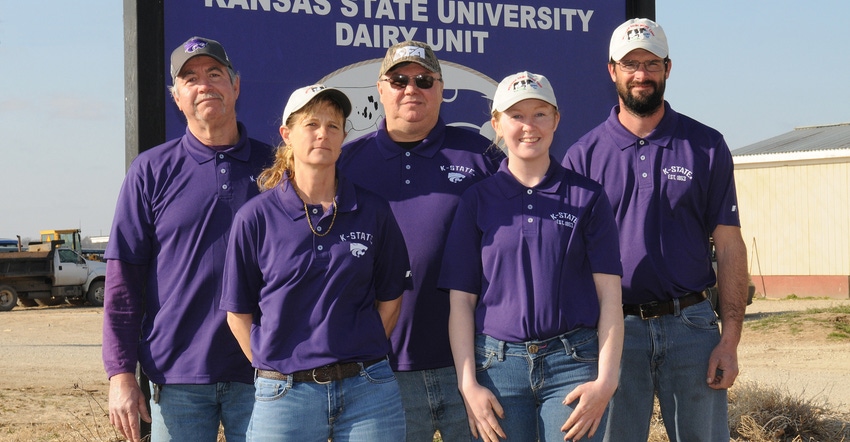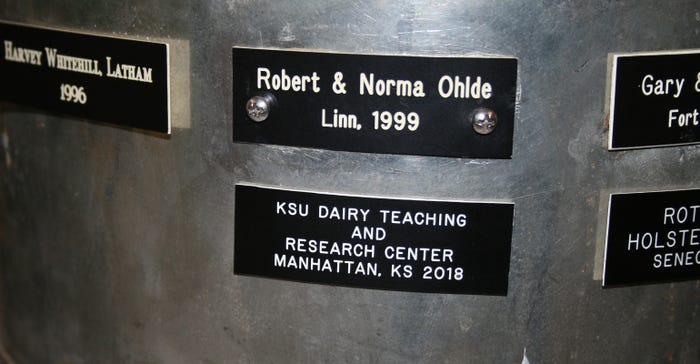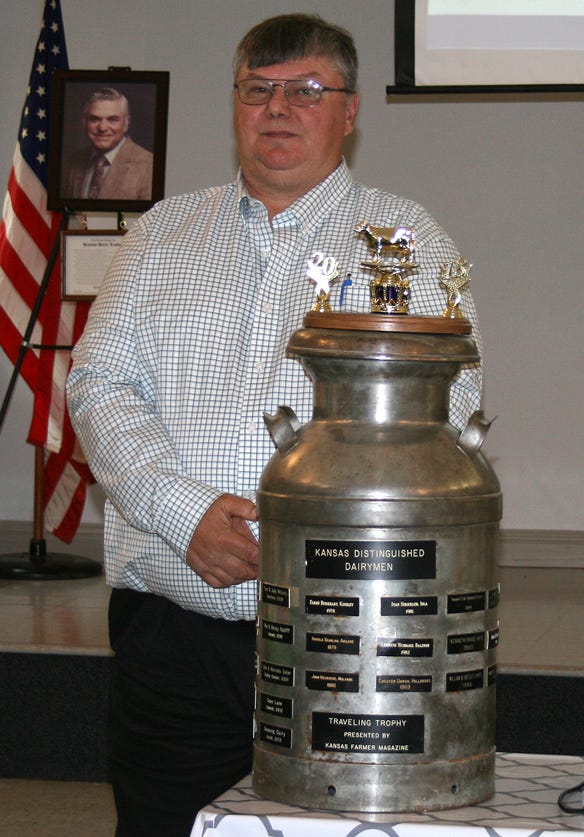
When it comes to managing a dairy herd, there are unique challenges when researching and teaching while at the same time striving for high productivity and excellent care cow care, cow comfort, excellent nutrition and progressive genetics.
In all of those attributes, the Kansas State University dairy herd has been a model in excellence since its first dairy began in 1900. That's why KSU's Dairy Training and Research Center was chosen for the 2018 Kansas Distinguished Dairy Award, presented by the university and Kansas Farmer magazine.
The DTRC has achieved greater than 30,000 pounds rolling herd average for many years, making it the most productive university research farm in the U.S. This has been the result of a team effort by faculty and dedicated staff, who strive every day to keep cows productive and health.
The current Holstein herd is comprised of 265 mature cows and 281 replacement heifers. The most recent test day information showed RHAs of 33,017 pounds of milk, 1,179 pounds of fat and 970 pounds of protein. When compared to the average production of the 11,306 herds in the Dairy Records Management Systems, the KSU herd greatly exceeds the average of 21,830 pounds of milk, 845 pounds of fat and 682 pounds of protein. The KSU herd ranks in the top 20 of all herds in the DRMS system for rolling herd milk production.
 LABEL: Every year, a new label is added to a traveling milk jug contributed by Kansas Farmer magazine. The jug stays with each year’s winner and passes to the new winner for display. K-State will display the jug in Call Hall on the K-State campus.
LABEL: Every year, a new label is added to a traveling milk jug contributed by Kansas Farmer magazine. The jug stays with each year’s winner and passes to the new winner for display. K-State will display the jug in Call Hall on the K-State campus.

Nearly all the cows in the university herd are involved in a reproductive experiment and one or more nutritional trials during each lactation, which makes the productivity record of the dairy stand out even more.
KSU has updated the original 1900 dairy twice, once in 1933 and again in 1977. Over the years since, significant improvements have been made to the sand bedded free stalls, commodity shed, feed storage and cow cooling. While the facilities have limitations, the team works very hard to keep cows comfortable and productive.
Plans are under way to rebuild the milking and animal housing facilities. This may include an expansion of the herd to allow for larger research opportunities. The new facilities will include robotic technology for milking and other activities.
However, like any family or commercial dairy, much of the success of the operation can be credited to the people who do the work day in and day out.
Mike Scheffel, DTRC manager, began working at the dairy as a student in 1988. He began full-time employment in 1991, and assumed the manager role in 2000. Mike works with 7 full-time employees and about 20 part-time student employees.
In addition to the duties of the dairy, he also oversees the production of the forages and nutrient management. Mike is a hands-on manager, and spends many hours each week training students. He is always ready and willing to help students increase their knowledge of dairy production and management.
Each year, more than 400 KSU students visit the farm for activities associated with various classes across the university.
Generally, about 40 to 50 students choose to show dairy heifers for the Little American Royal held each spring at KSU. Students spend many hours training and grooming the animals for the show. The show offers opportunities for both experienced and novice showmen. For many, this is their first experience in training and grooming dairy animals.
 HONORED: Kansas State University Dairy Teaching Research Center director Mike Scheffel won’t have his name on the famous traveling milk jug, but his portrait will hang in Call Hall as the 2018 honoree of the 2018 Kansas Distinguished Dairy Award.
HONORED: Kansas State University Dairy Teaching Research Center director Mike Scheffel won’t have his name on the famous traveling milk jug, but his portrait will hang in Call Hall as the 2018 honoree of the 2018 Kansas Distinguished Dairy Award.

In addition to the KSU students, the dairy hosts about 1,500 visitors each year. Many of these are grade school students from area schools. Some participate in the “Adopt A Cow” program where elementary students select a dry cow and then follow the activities of the animal until it calves. Often the animal calves right before the students visit the dairy on a field trip, so the students may have the opportunity to see the cow the adopted and the calf she produced. This activity has been helpful in helping non-farm young people understand more about the food production system and the dairy industry.
Use of protocols and expert advice have helped the dairy to continue to move forward on key issues of production and animal health. One of the key components has been the continued focus on producing high quality corn silage and other forages.
Corn silage production is a key summer activity for the farm, and it serves as the primary forage. Careful attention to harvest moisture and maturity, along with excellent silage bag management, has allowed the farm to daily deliver a constant nutrition program to the herd. In recent years, the farm has also utilized winter cover corps to supplement the forage program.
Over the decades, the DTRC has had a huge impact on the Kansas and U.S. dairy industry through the students who have been trained and have conducted research at the unit. In addition, research findings from the DTRC have been adopted throughout the world.
About the Author(s)
You May Also Like




